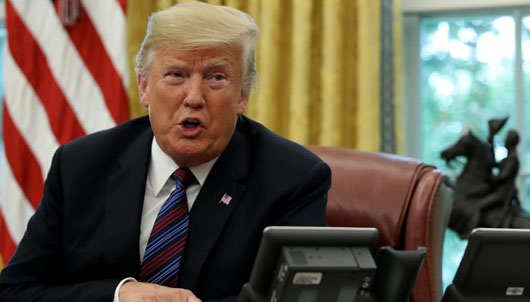by WorldTribune Staff, September 7, 2018
U.S. President Donald Trump is ditching the Marshall Plan playbook in favor of a “tough love” approach when it comes to the pricey business of nation-building, a report said.
Trump has made it clear that his administration “has no interest in embarking on the expensive nation-building missions that have characterized American conflicts of the postwar era,” The Washington Times reported on Sept. 5.

Trump’s “tough love” approach casts off the post-World War II Marshall Plan template “by forcing recipient nations and regional countries directly affected by crises to step up their own efforts,” the report said.
U.S. taxpayers won’t be on the hook even in ongoing crises such as the Syrian civil war and North Korean nuclear activity, Trump has aid.
“We won’t have to help them,” Trump told reporters in Singapore after his landmark summit in June with North Korean leader Kim Jong-Un when asked about U.S. aid to build up the North’s economy.
“The United States has been paying a big price at a lot of different places, but South Korea, which obviously is right next door, and Japan, which essentially is next door, they’re going to be helping them. … So they will be helping them,” Trump said.
The Trump administration “has reined in U.S.-led reconstruction efforts and demanded that other countries step up,” the report said, citing the decision late last month to cancel $230 million earmarked for rebuilding Syria.
Trump also last month “considered but decided against rescinding some $3 billion that Congress had allocated to the U.S. Agency for International Development and State Department,” the report said. Trump’s plan was to return the money to the Treasury.
State Department officials, at the direction of the White House, have shifted the roughly $200 million set aside for Syrian reconstruction toward other department priorities. The bulk of the funds to aid in Syria’s recovery will be derived from a $300 million allocation from allies in the U.S.-led coalition, including $100 million from Saudi Arabia, to fight Islamic State and other jihadi groups, the Washington Times’ report said.
Rex Tillerson, Trump’s first secretary of state, had led the effort to dedicate U.S. funds toward Syrian reconstruction. “The reconstruction and aid effort in Syria, as well as other areas of the world, have flamed out since his departure in March,” the report said.
Best Conservative Books in the War of Ideas
In a recent announcement that it will soon end payments to the United Nations Relief and Works Agency for Palestinian refugees, the State Department cited in part what it said was the agency’s failure to “mobilize adequate and appropriate burden-sharing.”
“The fundamental business model and fiscal practices that have marked UNRWA for years — tied to UNRWA’s endlessly and exponentially expanding community of entitled beneficiaries – is simply unsustainable and has been in crisis mode for many years,” the State Department said. “The United States will no longer commit further funding to this irredeemably flawed operation.”
Trump’s supporters say the president is playing a longer game as he tries to flesh out his “America first” domestic and foreign policy.
In regard to the Syrian aid cutoff, “the point is that it is not a sign of the U.S. disengaging in the region,” said James Carafano, head of the national security and foreign policy sector at The Heritage Foundation.
The decision on Syrian reconstruction funds “is reflective of the larger U.S. strategy, which I think a lot of people have lost sight of, except the president,” Carafano told The Washington Times, adding that “$200 or $300 million is not going to transform Syria into the land of milk and honey.”
Subscribe to Geostrategy-Direct __________ Support Free Press Foundation
